Extra Credit Project: Read a Book
Assignment
- Choose a book from the options below. They are organized by topic, so pick one that interests you.
- Acquire the book either from a library or a book store. The cover image is linked to the Amazon webpage for that book.
- Click on the title of the book to download the questions for the book. While (or after) you read the book, answer the questions on the worksheet in your own handwriting. Typed answers will not receive credit.
- Complete the supplemental reading verification form.
- Turn in the completed questions and the supplemental reading verification form to earn up to 100 extra points!
List of Books
ECOLOGY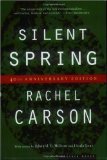 Silent Spring: (Rachel Carson). The book focuses on the poisons from insecticides, weed killers, and other common products as well as the use of sprays in agriculture, a practice that led to dangerous chemicals to the food source. Silent Spring: (Rachel Carson). The book focuses on the poisons from insecticides, weed killers, and other common products as well as the use of sprays in agriculture, a practice that led to dangerous chemicals to the food source. |
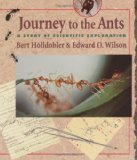 Journey to the Ants: (Bert Holldobler and E.O. Wilson). Offer a fascinating glimpse into the world of ants as well as their own personal adventures in the study of these insects. Journey to the Ants: (Bert Holldobler and E.O. Wilson). Offer a fascinating glimpse into the world of ants as well as their own personal adventures in the study of these insects. |
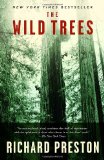 The Wild Trees: (Richard Preston). Includes the history of old-growth forests, canopy ecology, tells how gadgets and techniques to climb were invented and introduces recreational tree-climbing as a sport. The Wild Trees: (Richard Preston). Includes the history of old-growth forests, canopy ecology, tells how gadgets and techniques to climb were invented and introduces recreational tree-climbing as a sport. |
 The World Without Us: (Alan Weisman). If humans when extinct overnight, how long before all trace of humankind vanished? The World Without Us: (Alan Weisman). If humans when extinct overnight, how long before all trace of humankind vanished? |
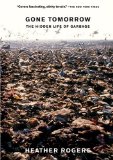 Gone Tomorrow: (Heather Rogers). Americans produce the most waste of any people on Earth, but few of us ever think about where all that trash goes. Rogers endeavors to show the inner workings of the waste stream, from the garbage truck to the landfill, incinerator or parts unknown. Gone Tomorrow: (Heather Rogers). Americans produce the most waste of any people on Earth, but few of us ever think about where all that trash goes. Rogers endeavors to show the inner workings of the waste stream, from the garbage truck to the landfill, incinerator or parts unknown. |
CELLS
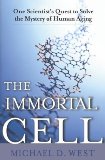 The Immortal Cell: (Michael D. West). A chronology of the emerging science of immortality and a personal journal of the path from creationist to scientist. It was West who announced that through somatic cell nuclear transfer they could create embryonic stem cells. The Immortal Cell: (Michael D. West). A chronology of the emerging science of immortality and a personal journal of the path from creationist to scientist. It was West who announced that through somatic cell nuclear transfer they could create embryonic stem cells. |
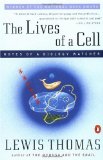 The Lives of a Cell: Notes of a Biology Watcher: (Lewis Thomas). A beautifully written collection of essays that bring one very close to a belief that in some way, all life is connected. The Lives of a Cell: Notes of a Biology Watcher: (Lewis Thomas). A beautifully written collection of essays that bring one very close to a belief that in some way, all life is connected. |
GENETICS
 Jurassic Park: (Michael Crichton) Crichton interweaves details of genetic engineering, computer wizardry and current scientific controversy over dinosaurs to fashion a scary, creepy, mesmerizing thriller. Jurassic Park: (Michael Crichton) Crichton interweaves details of genetic engineering, computer wizardry and current scientific controversy over dinosaurs to fashion a scary, creepy, mesmerizing thriller. |
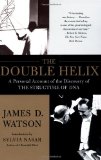 The Double Helix: A Personal Account of the Discovery of the Structure of DNA: (James Watson). Describes the many minds involved in the ultimate understanding of what DNA looks like and how it multiplies. The Double Helix: A Personal Account of the Discovery of the Structure of DNA: (James Watson). Describes the many minds involved in the ultimate understanding of what DNA looks like and how it multiplies. |
 The Journey of Man: (Spencer Wells). Tracking human relatedness and migration by examining Y-chromosome similarities and differences among current humans. The Journey of Man: (Spencer Wells). Tracking human relatedness and migration by examining Y-chromosome similarities and differences among current humans. |
 Abraham Lincoln's DNA: (Philip R. Reilly). An enjoyable series of vignettes that explain the fundamental tools of the modern genetics detective in the course of fascinating historical tales. Abraham Lincoln's DNA: (Philip R. Reilly). An enjoyable series of vignettes that explain the fundamental tools of the modern genetics detective in the course of fascinating historical tales. |
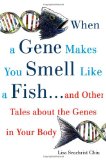 When a Gene Makes You Smell Like a Fish: (Lisa Seachrist Chiu). A remarkable collection of stories about the discovery and elucidation of some rare or not so rare genetic disorders. When a Gene Makes You Smell Like a Fish: (Lisa Seachrist Chiu). A remarkable collection of stories about the discovery and elucidation of some rare or not so rare genetic disorders. |
 Panic in Level 4: (Richard Preston). Essays that cover genome mapper Craig Venter; a gene that leads people to cannibalize themselves; and two Russian-Jewish émigré scientists who built a monster computer in their cramped apartment to puzzle out patterns in the value of pi. Panic in Level 4: (Richard Preston). Essays that cover genome mapper Craig Venter; a gene that leads people to cannibalize themselves; and two Russian-Jewish émigré scientists who built a monster computer in their cramped apartment to puzzle out patterns in the value of pi. |
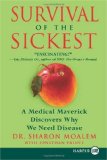 Survival of the Sickest: (Sharon Moalem). Addresses a number of provocative questions, such as why debilitating hereditary diseases persist in humans and why we suffer from the consequences of aging. Survival of the Sickest: (Sharon Moalem). Addresses a number of provocative questions, such as why debilitating hereditary diseases persist in humans and why we suffer from the consequences of aging. |
EVOLUTION
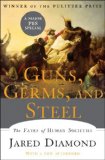 Guns, Germs, Steel: (Jared Diamond). Through the lens of an evolutionary biologist, Diamond reviews human history on every continent since the Ice Age at a rate that emphasizes the movements of peoples and ideas. Guns, Germs, Steel: (Jared Diamond). Through the lens of an evolutionary biologist, Diamond reviews human history on every continent since the Ice Age at a rate that emphasizes the movements of peoples and ideas. |
 The Origin of Species: (Charles Darwin). One of the most important and influential books ever written, it is one of the very few groundbreaking works of science that is truly readable. The Origin of Species: (Charles Darwin). One of the most important and influential books ever written, it is one of the very few groundbreaking works of science that is truly readable. |
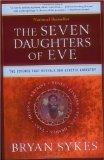 The Seven Daughters of Eve: (Bryan Sykes). Decoding mitochondrial DNA and using this knowledge to trace the path of human evolution, Sykes relates personal and historical anecdotes, offering familiar ground from which to consider the science. The Seven Daughters of Eve: (Bryan Sykes). Decoding mitochondrial DNA and using this knowledge to trace the path of human evolution, Sykes relates personal and historical anecdotes, offering familiar ground from which to consider the science. |
THE BRAIN
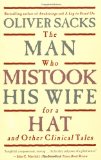 The Man Who Mistook His Wife for a Hat: (Oliver Sacks) Clinical tales drawn from fascinating and unusual cases introduces real people who suffer from a variety of neurological syndromes which include symptoms such as amnesia, uncontrolled movements, and musical hallucinations. The Man Who Mistook His Wife for a Hat: (Oliver Sacks) Clinical tales drawn from fascinating and unusual cases introduces real people who suffer from a variety of neurological syndromes which include symptoms such as amnesia, uncontrolled movements, and musical hallucinations. |
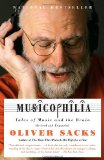 Musicophilia: (Oliver Sacks) Explores the effects of music on the human brain. Clinical studies from individuals afflicted by an inability to connect with any melody to Alzheimer's patients who find order and comfort through music. Musicophilia: (Oliver Sacks) Explores the effects of music on the human brain. Clinical studies from individuals afflicted by an inability to connect with any melody to Alzheimer's patients who find order and comfort through music. |
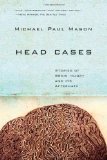 Head Cases: (Michael Paul Mason). This book takes us into the dark side of the brain in an astonishing sequence of stories, at once true and strange, from the world of brain injury. Head Cases: (Michael Paul Mason). This book takes us into the dark side of the brain in an astonishing sequence of stories, at once true and strange, from the world of brain injury. |
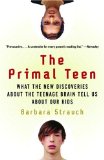 Primal Teen: (Barbara Strauch). The latest research, including brain scans that show changes in the brain's structure and function that could explain the crazy behavior exhibited by teens. Primal Teen: (Barbara Strauch). The latest research, including brain scans that show changes in the brain's structure and function that could explain the crazy behavior exhibited by teens. |
INFECTIOUS DISEASE
 The Woman with a Worm in Her Head: (Pamela Nagami) A collection of infectious disease essays, including AIDS, chickenpox and flesh-eating bacteria. The Woman with a Worm in Her Head: (Pamela Nagami) A collection of infectious disease essays, including AIDS, chickenpox and flesh-eating bacteria. |
 The Demon in the Freezer:(Richard Preston). A thriller that focuses on smallpox and the threat it plays as a bioterrorism agent. The Demon in the Freezer:(Richard Preston). A thriller that focuses on smallpox and the threat it plays as a bioterrorism agent. |
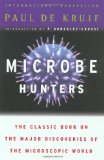 Microbe Hunters: (Paul de Kruif). In this classic bestseller, Paul de Kruif dramatizes the pioneering bacteriological work of such scientists as Leeuwenhoek, Spallanzani, Koch, Pasteur, Reed, and Ehrlich. Microbe Hunters: (Paul de Kruif). In this classic bestseller, Paul de Kruif dramatizes the pioneering bacteriological work of such scientists as Leeuwenhoek, Spallanzani, Koch, Pasteur, Reed, and Ehrlich. |
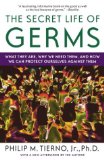 The Secret Life of Germs: (Phillip Tierno). The story of bacteria, viruses, and prions and their myriad effects on human beings. From toxic shock syndrome to Lyme disease to diarrheal infections of the Third World. The Secret Life of Germs: (Phillip Tierno). The story of bacteria, viruses, and prions and their myriad effects on human beings. From toxic shock syndrome to Lyme disease to diarrheal infections of the Third World. |
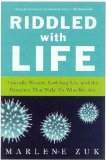 Riddled with Life: (Marlene Zuk). Stories of human parasites and how humans and our parasites have co-evolved. Riddled with Life: (Marlene Zuk). Stories of human parasites and how humans and our parasites have co-evolved. |
 Parasite Rex: (Carl Zimmer). From tapeworms to isopods to ichneumon wasps, "parasites are complex, highly adapted creatures that are at the heart of the story of life." Parasite Rex: (Carl Zimmer). From tapeworms to isopods to ichneumon wasps, "parasites are complex, highly adapted creatures that are at the heart of the story of life." |
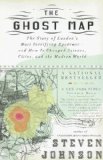 Ghost Map: (Steven Johnson). On August 28, 1854, working-class Londoner Sarah Lewis tossed a bucket of soiled water into the cesspool of her squalid apartment building and triggered the deadliest outbreak of cholera in the city's history. Ghost Map: (Steven Johnson). On August 28, 1854, working-class Londoner Sarah Lewis tossed a bucket of soiled water into the cesspool of her squalid apartment building and triggered the deadliest outbreak of cholera in the city's history. |
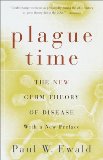 Plague Time: (Paul Ewald). Ewald argues that cancer, heart disease, and arthritis are not necessarily caused by a breakdown of the human body, but by the action of infectious agents and by the immune response to those agents. Plague Time: (Paul Ewald). Ewald argues that cancer, heart disease, and arthritis are not necessarily caused by a breakdown of the human body, but by the action of infectious agents and by the immune response to those agents. |
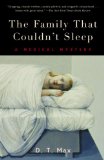 The Family that Couldn't Sleep: (T.D. Max). The case of an Italian family whose members succumb to a sleeping disorder that causes not only insomnia but certain death. The cause of this disease is determined to be prions—infectious agents derived from proteins. The Family that Couldn't Sleep: (T.D. Max). The case of an Italian family whose members succumb to a sleeping disorder that causes not only insomnia but certain death. The cause of this disease is determined to be prions—infectious agents derived from proteins. |
MEDICAL STORIES
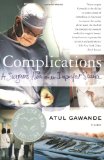 Complications: A Surgeon's Note on an Imperfect Science: (Atul Gawande) Edgy accounts of medical traumas and sobering analyses of doctors' anxieties and burnout. Complications: A Surgeon's Note on an Imperfect Science: (Atul Gawande) Edgy accounts of medical traumas and sobering analyses of doctors' anxieties and burnout. |
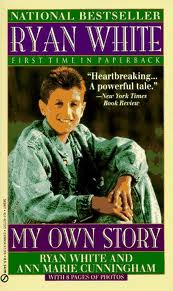 Ryan White, My Own Story: (Ryan White). Although Ryan White was born with hemophilia, the boy and his family were determined that he live as normal a life as possible. But, given contaminated blood in a transfusion, Ryan contracted AIDS. Ryan White, My Own Story: (Ryan White). Although Ryan White was born with hemophilia, the boy and his family were determined that he live as normal a life as possible. But, given contaminated blood in a transfusion, Ryan contracted AIDS. |
 What Patients Taught Me: (Audrey Young). A firsthand depiction of the hardships and rewards of medical school, this sensitive memoir may serve as a guide to help readers who are considering traversing that same path. What Patients Taught Me: (Audrey Young). A firsthand depiction of the hardships and rewards of medical school, this sensitive memoir may serve as a guide to help readers who are considering traversing that same path. |
WOMEN IN SCIENCE
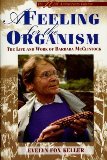 A Feeling for the Organism: The Life and Work of Barbara McClintock: (Evelyn Fox Keller). An insightful and thought-provoking book about women in science and the role of dissent in the scientific community. A Feeling for the Organism: The Life and Work of Barbara McClintock: (Evelyn Fox Keller). An insightful and thought-provoking book about women in science and the role of dissent in the scientific community. |
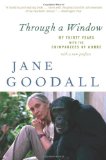 Through a Window: My Thirty Years with the Chimpanzees of Gombe: (Jane Goodall). A saga of chimpanzee families with an engrossing account of animal behavior. Through a Window: My Thirty Years with the Chimpanzees of Gombe: (Jane Goodall). A saga of chimpanzee families with an engrossing account of animal behavior. |
 Rosalind Franklin: The Dark Lady of DNA: (Brenda Maddox). A powerful story of a remarkably single-minded, forthright, and tempestuous young woman who was airbrushed out of the greatest scientific discovery of the twentieth century. Rosalind Franklin: The Dark Lady of DNA: (Brenda Maddox). A powerful story of a remarkably single-minded, forthright, and tempestuous young woman who was airbrushed out of the greatest scientific discovery of the twentieth century. |
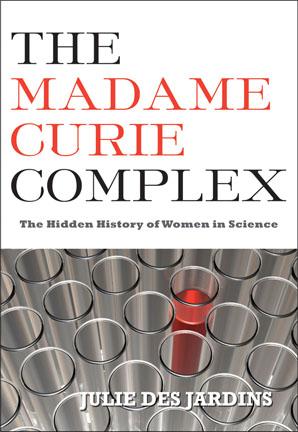 The Madame Curie Complex: The Hidden History of Women in Science: (Julie Des Jardins). An exploration of how the gendered culture of science has molded the methods, structure, and experience of the work. Women scientists have often asked different questions, used different methods, come up with different explanations for phenomena in the natural world, and they have forever transformed a scientist's role. The Madame Curie Complex: The Hidden History of Women in Science: (Julie Des Jardins). An exploration of how the gendered culture of science has molded the methods, structure, and experience of the work. Women scientists have often asked different questions, used different methods, come up with different explanations for phenomena in the natural world, and they have forever transformed a scientist's role. |
